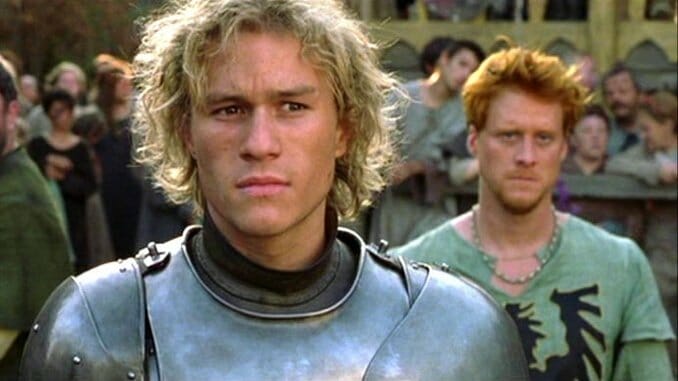At 20, A Knight’s Tale Is Not Found Wanting
The off-beat underdog story is now a star-studded curiosity.

A Knight’s Tale was the kind of movie your high school friends dragged you to on some muggy May evening, the kind of film of which you could predict every single story beat a good 10 minutes before it happened. This is how I experienced it. For some reason, though, I haven’t forgotten it in the 20 years since it came out, even down to incidental lines of dialogue. By virtue of its cast—which over the past two decades have become major stars—it has become an odd entry in the filmography of some highly visible actors. But it’s the beautifully ridiculous trappings of it, the manic love it evinces for some of the fustiest literary history you napped through in AP English, that makes it a bemusing curiosity.
This is true even setting aside the fact you will see a buck-ass naked Paul Bettany in it.

Young William (Heath Ledger) is the low-born squire of an old knight who, as we start the story, has unceremoniously died. He was not merely William’s mentor, but his meal ticket. With the help of fellow squires Roland (Mark Addy, a character actor recognizable in numerous other roles that include Robert Baratheon in Game of Thrones) and Wat (all-purpose goofball Alan Tudyk), William dons their deceased liege’s armor and manages to eke out a victory in the jousting tourney. Against the better judgment of his fellows, William convinces them all to help him train to compete in other tournaments. The catch is that as a peasant, William isn’t technically allowed to compete, so they’ll need to lie about his parentage.
Fortunately for William, the means to do so literally wanders by on the road to the next tournament, in the glorious, nude form of Paul Bettany, who introduces himself as a little-known poet and writer by the name of Geoffrey Chaucer. Chaucer has literally lost his shirt gambling, but offers William and his band his expertise in bullshitting. With his noble lineage properly forged, William (having adopted the totally believable moniker of Ulrich von Lichtenstein of Gelderland) enters the tournament and acquits himself pretty well for a guy with raggedy armor and not much experience.
While tilting at his foes, William becomes enamored of the young Jocelyn (Shannon Sossamon) and makes an enemy of the Count Adhemar (a sneering Rufus Sewell). A Knight’s Tale follows William’s quest to knock big dudes off their horses real good so as to impress Jocelyn and humble Adhemar. Nothing about the plot is important, anymore than anything about the plot of Dodgeball is. What is important is how the movie rejects everything that would have made this another too-serious period piece.

-

-

-

-

-

-

-

-

-

-

-

-

-

-

-

-

-

-

-

-

-

-

-

-

-

-

-

-

-

-

-

-

-

-

-

-

-

-

-

-









































